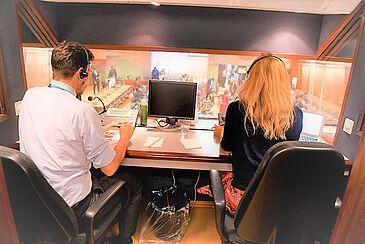These language services are provided in English, French, Spanish and Russian and their goal is to help indigenous representatives (who come from the seven social and cultural regions of indigenous peoples) present their situation, exchange and actively participate in the negotiations and discussions around the topics that concern them.
Interpretation services are provided to indigenous delegates for sessions and side events, daily preparatory meetings (commonly referred to as "Indigenous Caucuses") and all sorts of formal or informal bilateral meetings as part of the of the above-mentioned UN bodies.
Translation services are provided to indigenous peoples' representatives for the translation of their declarations (individual or collective) and of any other documents relevant to those mechanisms (reports, concept notes, articles, presentations etc.)










